Culture, Health and Illness Anthropology: ANTH 227 Article Review
VerifiedAdded on 2022/11/19
|7
|1141
|313
Report
AI Summary
This paper presents an article review on the intersection of medical anthropology and epidemiology, focusing on culture, health, and illness. The review examines an article reflecting on medical anthropology and epidemiology, delving into the historical context of anthropological engagement with global public health initiatives. The review covers key aspects such as social epidemiology, the influence of social and cultural factors on health outcomes, and the importance of non-Western medical systems. It analyzes the article's strengths, including its exploration of social relations, cultural change, and their biological consequences. The paper also discusses the significance of interdisciplinary work and the conceptual development of epidemiology, concluding with the vital role of anthropology and epidemiology in understanding and improving public health systems.
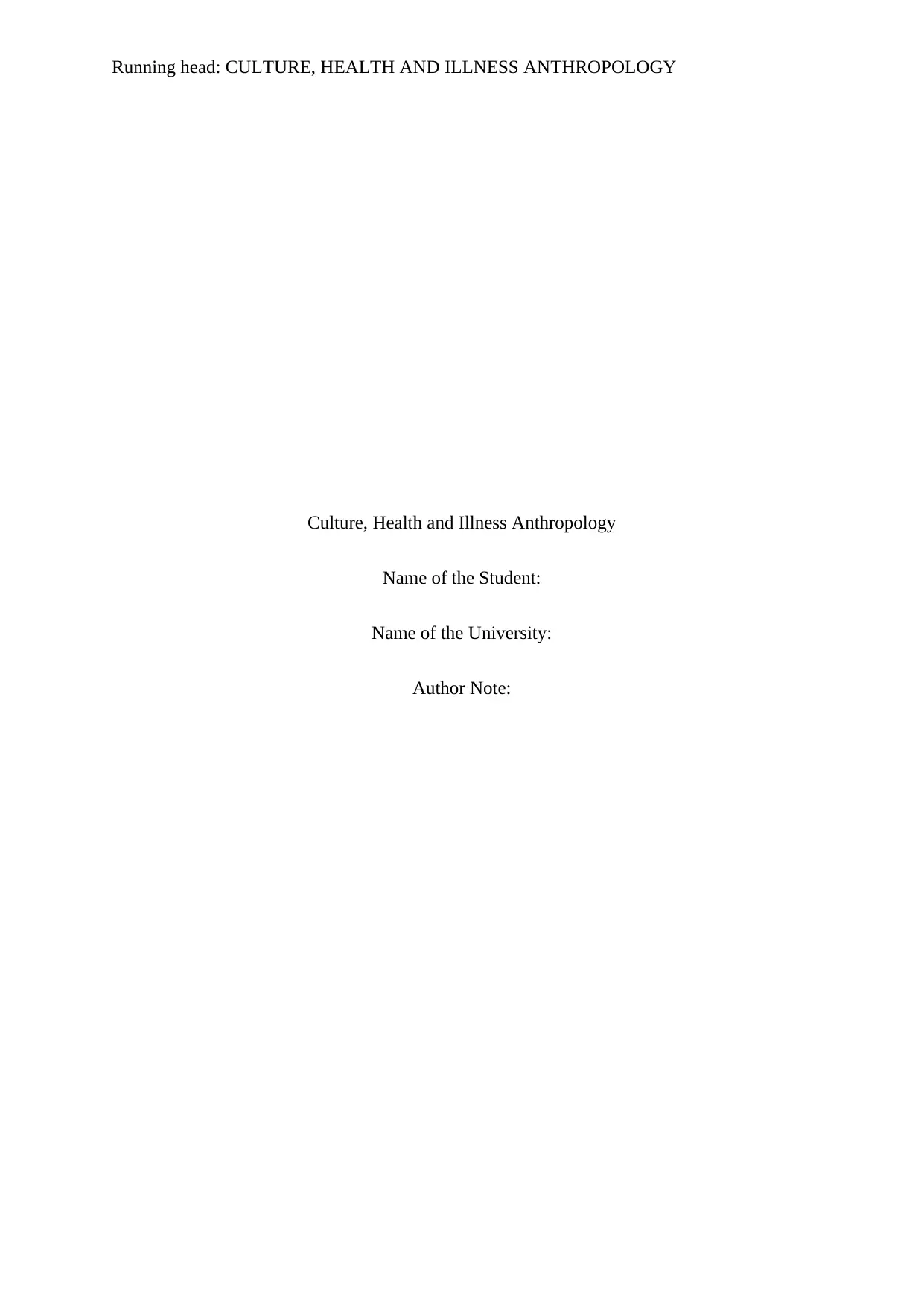
Running head: CULTURE, HEALTH AND ILLNESS ANTHROPOLOGY
Culture, Health and Illness Anthropology
Name of the Student:
Name of the University:
Author Note:
Culture, Health and Illness Anthropology
Name of the Student:
Name of the University:
Author Note:
Paraphrase This Document
Need a fresh take? Get an instant paraphrase of this document with our AI Paraphraser
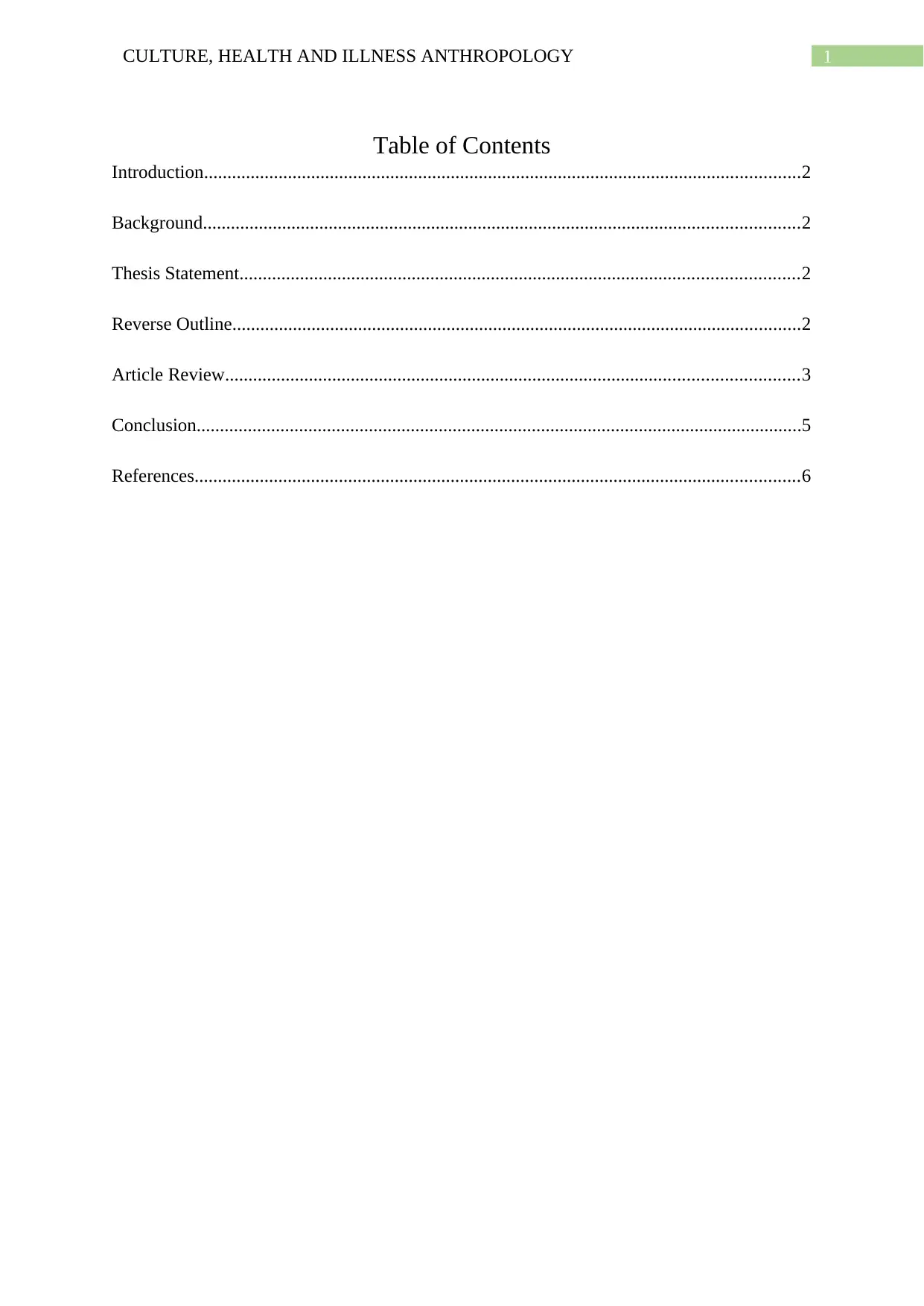
1CULTURE, HEALTH AND ILLNESS ANTHROPOLOGY
Table of Contents
Introduction................................................................................................................................2
Background................................................................................................................................2
Thesis Statement........................................................................................................................2
Reverse Outline..........................................................................................................................2
Article Review...........................................................................................................................3
Conclusion..................................................................................................................................5
References..................................................................................................................................6
Table of Contents
Introduction................................................................................................................................2
Background................................................................................................................................2
Thesis Statement........................................................................................................................2
Reverse Outline..........................................................................................................................2
Article Review...........................................................................................................................3
Conclusion..................................................................................................................................5
References..................................................................................................................................6
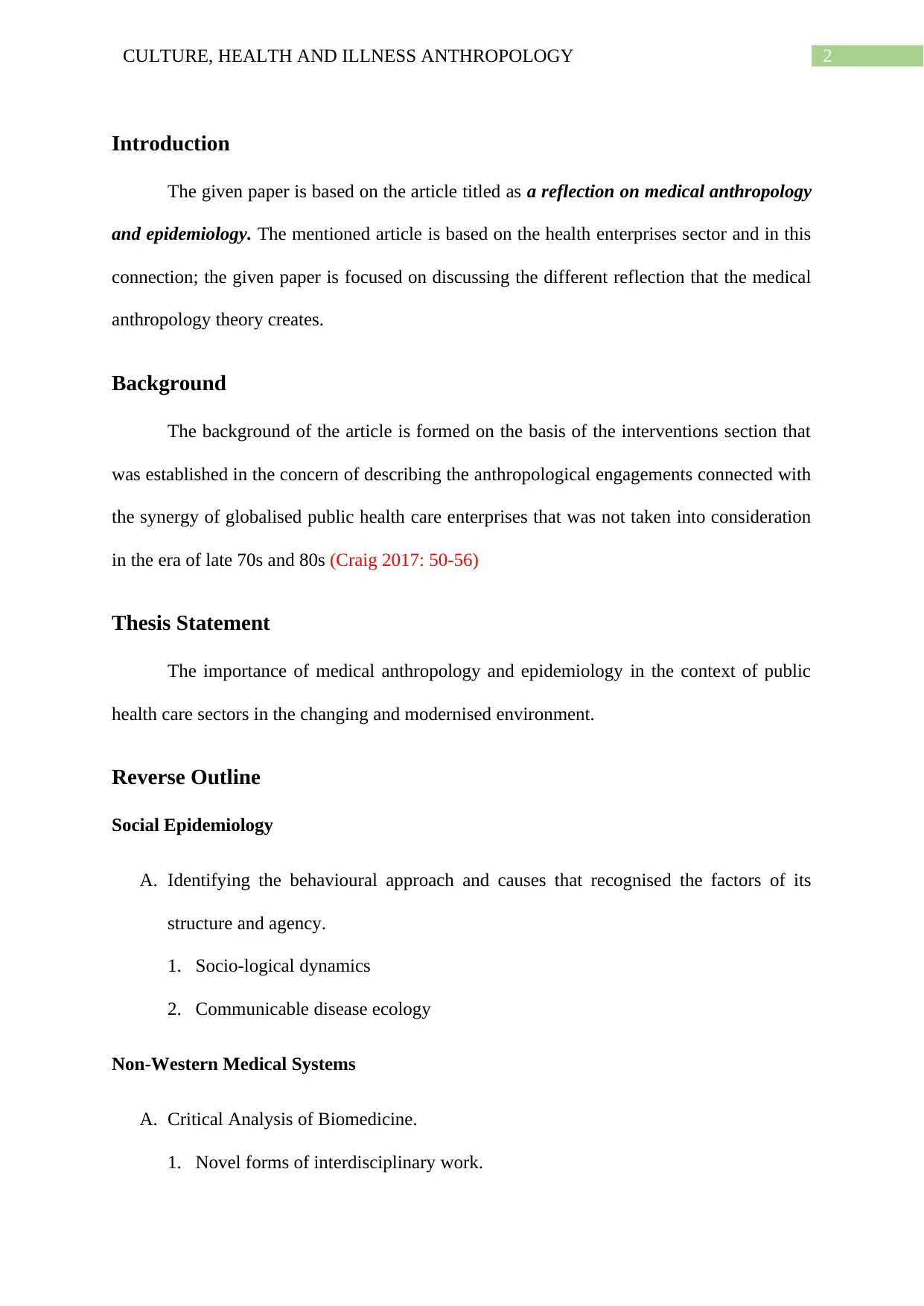
2CULTURE, HEALTH AND ILLNESS ANTHROPOLOGY
Introduction
The given paper is based on the article titled as a reflection on medical anthropology
and epidemiology. The mentioned article is based on the health enterprises sector and in this
connection; the given paper is focused on discussing the different reflection that the medical
anthropology theory creates.
Background
The background of the article is formed on the basis of the interventions section that
was established in the concern of describing the anthropological engagements connected with
the synergy of globalised public health care enterprises that was not taken into consideration
in the era of late 70s and 80s (Craig 2017: 50-56)
Thesis Statement
The importance of medical anthropology and epidemiology in the context of public
health care sectors in the changing and modernised environment.
Reverse Outline
Social Epidemiology
A. Identifying the behavioural approach and causes that recognised the factors of its
structure and agency.
1. Socio-logical dynamics
2. Communicable disease ecology
Non-Western Medical Systems
A. Critical Analysis of Biomedicine.
1. Novel forms of interdisciplinary work.
Introduction
The given paper is based on the article titled as a reflection on medical anthropology
and epidemiology. The mentioned article is based on the health enterprises sector and in this
connection; the given paper is focused on discussing the different reflection that the medical
anthropology theory creates.
Background
The background of the article is formed on the basis of the interventions section that
was established in the concern of describing the anthropological engagements connected with
the synergy of globalised public health care enterprises that was not taken into consideration
in the era of late 70s and 80s (Craig 2017: 50-56)
Thesis Statement
The importance of medical anthropology and epidemiology in the context of public
health care sectors in the changing and modernised environment.
Reverse Outline
Social Epidemiology
A. Identifying the behavioural approach and causes that recognised the factors of its
structure and agency.
1. Socio-logical dynamics
2. Communicable disease ecology
Non-Western Medical Systems
A. Critical Analysis of Biomedicine.
1. Novel forms of interdisciplinary work.
⊘ This is a preview!⊘
Do you want full access?
Subscribe today to unlock all pages.

Trusted by 1+ million students worldwide
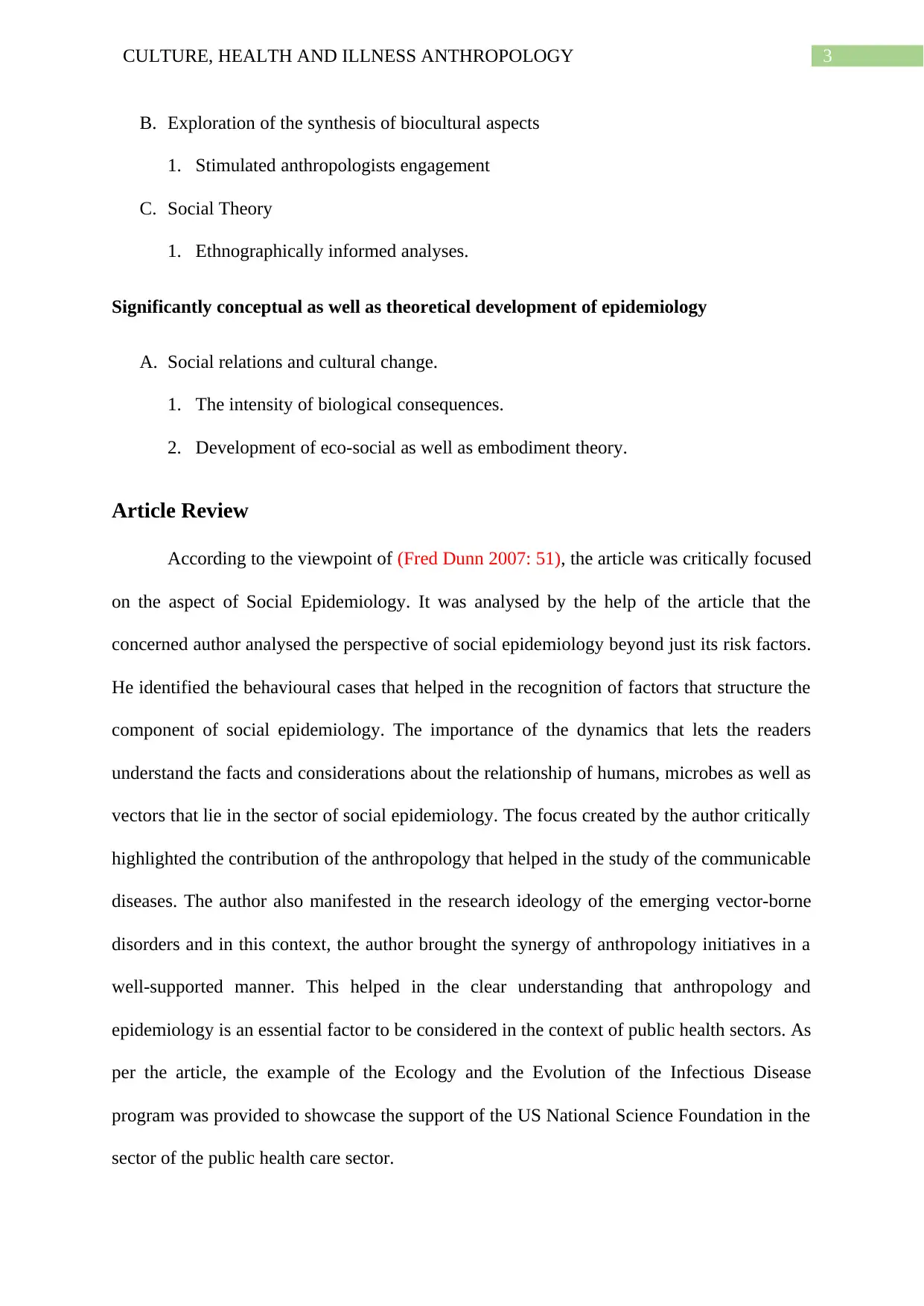
3CULTURE, HEALTH AND ILLNESS ANTHROPOLOGY
B. Exploration of the synthesis of biocultural aspects
1. Stimulated anthropologists engagement
C. Social Theory
1. Ethnographically informed analyses.
Significantly conceptual as well as theoretical development of epidemiology
A. Social relations and cultural change.
1. The intensity of biological consequences.
2. Development of eco-social as well as embodiment theory.
Article Review
According to the viewpoint of (Fred Dunn 2007: 51), the article was critically focused
on the aspect of Social Epidemiology. It was analysed by the help of the article that the
concerned author analysed the perspective of social epidemiology beyond just its risk factors.
He identified the behavioural cases that helped in the recognition of factors that structure the
component of social epidemiology. The importance of the dynamics that lets the readers
understand the facts and considerations about the relationship of humans, microbes as well as
vectors that lie in the sector of social epidemiology. The focus created by the author critically
highlighted the contribution of the anthropology that helped in the study of the communicable
diseases. The author also manifested in the research ideology of the emerging vector-borne
disorders and in this context, the author brought the synergy of anthropology initiatives in a
well-supported manner. This helped in the clear understanding that anthropology and
epidemiology is an essential factor to be considered in the context of public health sectors. As
per the article, the example of the Ecology and the Evolution of the Infectious Disease
program was provided to showcase the support of the US National Science Foundation in the
sector of the public health care sector.
B. Exploration of the synthesis of biocultural aspects
1. Stimulated anthropologists engagement
C. Social Theory
1. Ethnographically informed analyses.
Significantly conceptual as well as theoretical development of epidemiology
A. Social relations and cultural change.
1. The intensity of biological consequences.
2. Development of eco-social as well as embodiment theory.
Article Review
According to the viewpoint of (Fred Dunn 2007: 51), the article was critically focused
on the aspect of Social Epidemiology. It was analysed by the help of the article that the
concerned author analysed the perspective of social epidemiology beyond just its risk factors.
He identified the behavioural cases that helped in the recognition of factors that structure the
component of social epidemiology. The importance of the dynamics that lets the readers
understand the facts and considerations about the relationship of humans, microbes as well as
vectors that lie in the sector of social epidemiology. The focus created by the author critically
highlighted the contribution of the anthropology that helped in the study of the communicable
diseases. The author also manifested in the research ideology of the emerging vector-borne
disorders and in this context, the author brought the synergy of anthropology initiatives in a
well-supported manner. This helped in the clear understanding that anthropology and
epidemiology is an essential factor to be considered in the context of public health sectors. As
per the article, the example of the Ecology and the Evolution of the Infectious Disease
program was provided to showcase the support of the US National Science Foundation in the
sector of the public health care sector.
Paraphrase This Document
Need a fresh take? Get an instant paraphrase of this document with our AI Paraphraser
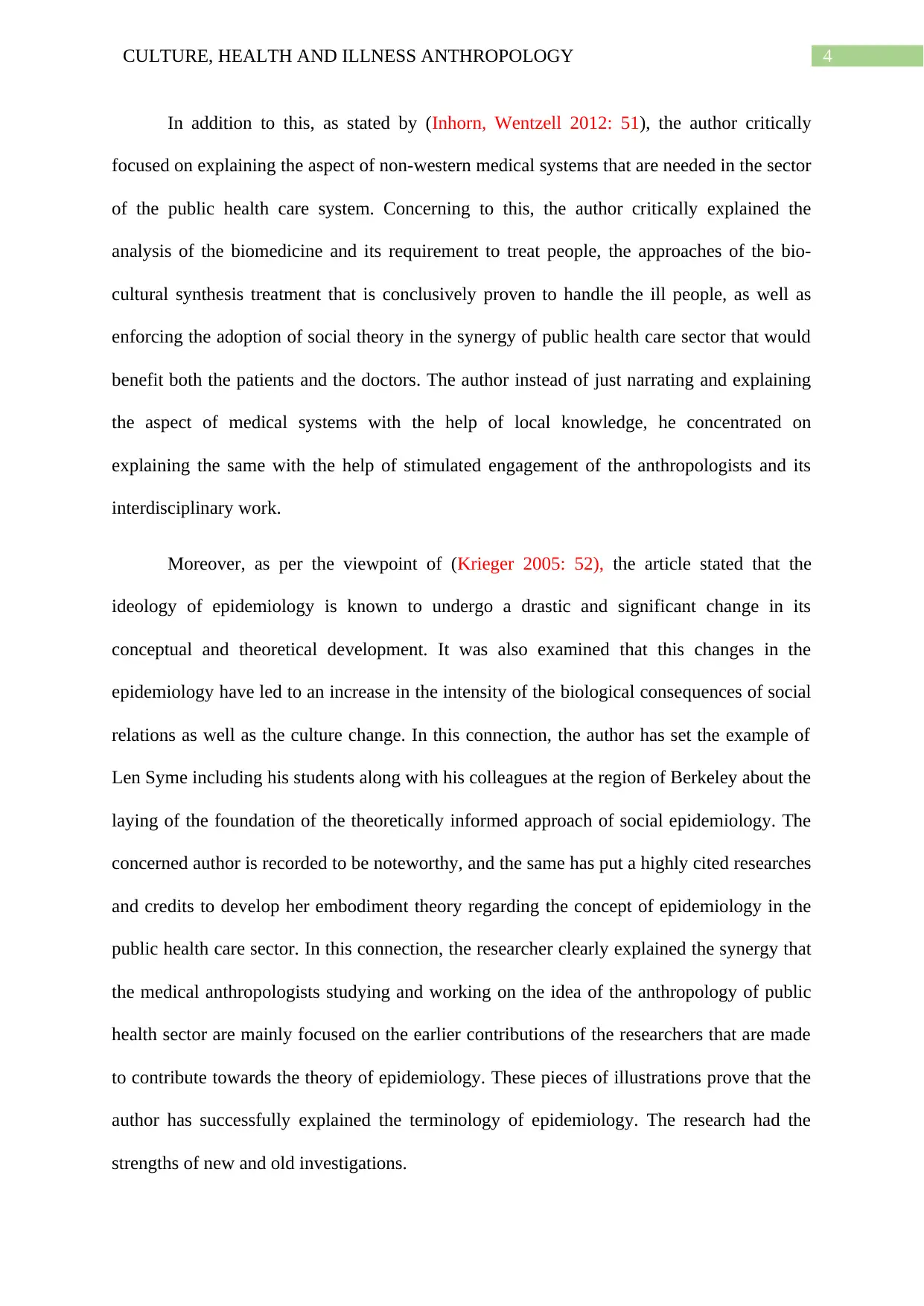
4CULTURE, HEALTH AND ILLNESS ANTHROPOLOGY
In addition to this, as stated by (Inhorn, Wentzell 2012: 51), the author critically
focused on explaining the aspect of non-western medical systems that are needed in the sector
of the public health care system. Concerning to this, the author critically explained the
analysis of the biomedicine and its requirement to treat people, the approaches of the bio-
cultural synthesis treatment that is conclusively proven to handle the ill people, as well as
enforcing the adoption of social theory in the synergy of public health care sector that would
benefit both the patients and the doctors. The author instead of just narrating and explaining
the aspect of medical systems with the help of local knowledge, he concentrated on
explaining the same with the help of stimulated engagement of the anthropologists and its
interdisciplinary work.
Moreover, as per the viewpoint of (Krieger 2005: 52), the article stated that the
ideology of epidemiology is known to undergo a drastic and significant change in its
conceptual and theoretical development. It was also examined that this changes in the
epidemiology have led to an increase in the intensity of the biological consequences of social
relations as well as the culture change. In this connection, the author has set the example of
Len Syme including his students along with his colleagues at the region of Berkeley about the
laying of the foundation of the theoretically informed approach of social epidemiology. The
concerned author is recorded to be noteworthy, and the same has put a highly cited researches
and credits to develop her embodiment theory regarding the concept of epidemiology in the
public health care sector. In this connection, the researcher clearly explained the synergy that
the medical anthropologists studying and working on the idea of the anthropology of public
health sector are mainly focused on the earlier contributions of the researchers that are made
to contribute towards the theory of epidemiology. These pieces of illustrations prove that the
author has successfully explained the terminology of epidemiology. The research had the
strengths of new and old investigations.
In addition to this, as stated by (Inhorn, Wentzell 2012: 51), the author critically
focused on explaining the aspect of non-western medical systems that are needed in the sector
of the public health care system. Concerning to this, the author critically explained the
analysis of the biomedicine and its requirement to treat people, the approaches of the bio-
cultural synthesis treatment that is conclusively proven to handle the ill people, as well as
enforcing the adoption of social theory in the synergy of public health care sector that would
benefit both the patients and the doctors. The author instead of just narrating and explaining
the aspect of medical systems with the help of local knowledge, he concentrated on
explaining the same with the help of stimulated engagement of the anthropologists and its
interdisciplinary work.
Moreover, as per the viewpoint of (Krieger 2005: 52), the article stated that the
ideology of epidemiology is known to undergo a drastic and significant change in its
conceptual and theoretical development. It was also examined that this changes in the
epidemiology have led to an increase in the intensity of the biological consequences of social
relations as well as the culture change. In this connection, the author has set the example of
Len Syme including his students along with his colleagues at the region of Berkeley about the
laying of the foundation of the theoretically informed approach of social epidemiology. The
concerned author is recorded to be noteworthy, and the same has put a highly cited researches
and credits to develop her embodiment theory regarding the concept of epidemiology in the
public health care sector. In this connection, the researcher clearly explained the synergy that
the medical anthropologists studying and working on the idea of the anthropology of public
health sector are mainly focused on the earlier contributions of the researchers that are made
to contribute towards the theory of epidemiology. These pieces of illustrations prove that the
author has successfully explained the terminology of epidemiology. The research had the
strengths of new and old investigations.
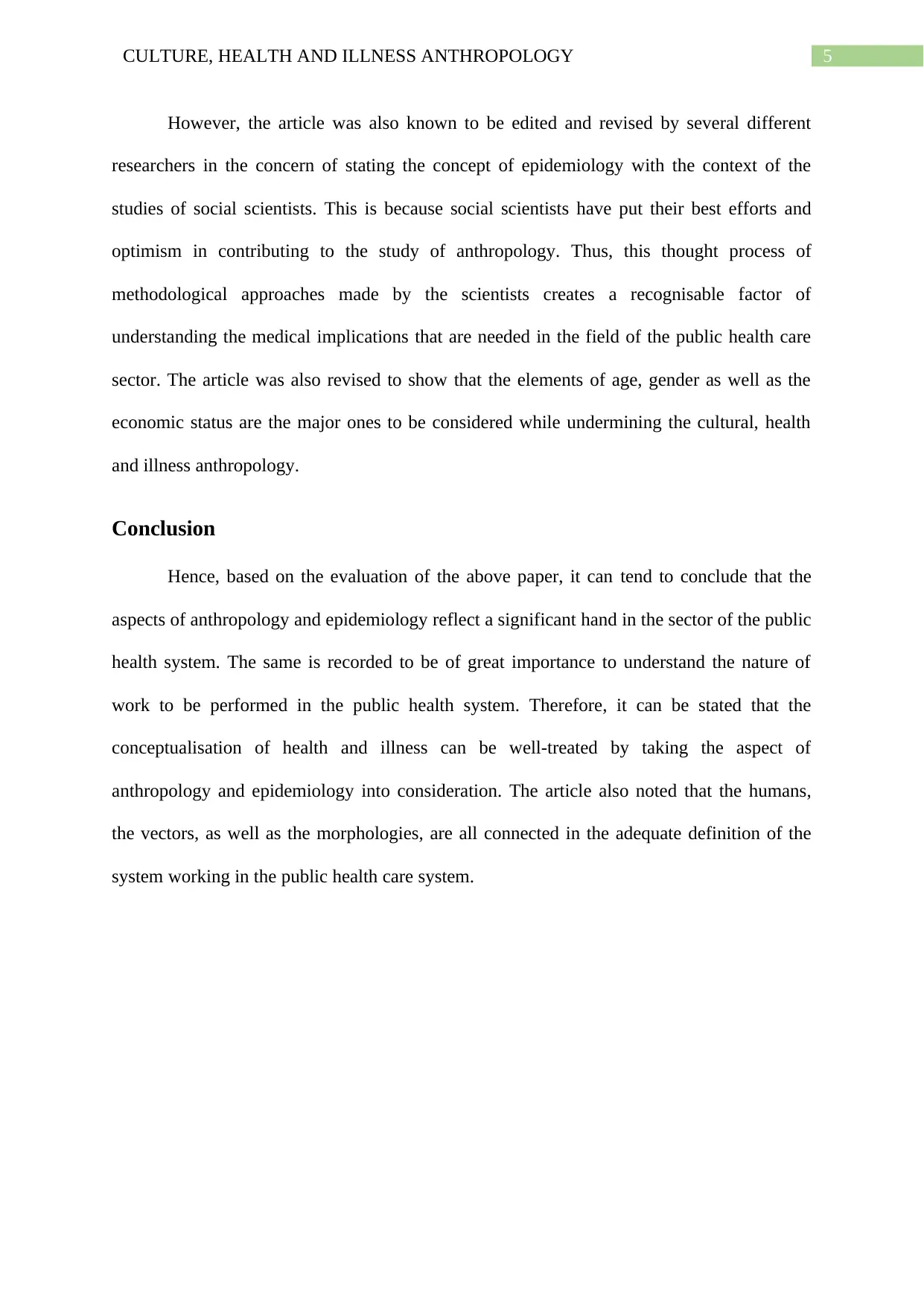
5CULTURE, HEALTH AND ILLNESS ANTHROPOLOGY
However, the article was also known to be edited and revised by several different
researchers in the concern of stating the concept of epidemiology with the context of the
studies of social scientists. This is because social scientists have put their best efforts and
optimism in contributing to the study of anthropology. Thus, this thought process of
methodological approaches made by the scientists creates a recognisable factor of
understanding the medical implications that are needed in the field of the public health care
sector. The article was also revised to show that the elements of age, gender as well as the
economic status are the major ones to be considered while undermining the cultural, health
and illness anthropology.
Conclusion
Hence, based on the evaluation of the above paper, it can tend to conclude that the
aspects of anthropology and epidemiology reflect a significant hand in the sector of the public
health system. The same is recorded to be of great importance to understand the nature of
work to be performed in the public health system. Therefore, it can be stated that the
conceptualisation of health and illness can be well-treated by taking the aspect of
anthropology and epidemiology into consideration. The article also noted that the humans,
the vectors, as well as the morphologies, are all connected in the adequate definition of the
system working in the public health care system.
However, the article was also known to be edited and revised by several different
researchers in the concern of stating the concept of epidemiology with the context of the
studies of social scientists. This is because social scientists have put their best efforts and
optimism in contributing to the study of anthropology. Thus, this thought process of
methodological approaches made by the scientists creates a recognisable factor of
understanding the medical implications that are needed in the field of the public health care
sector. The article was also revised to show that the elements of age, gender as well as the
economic status are the major ones to be considered while undermining the cultural, health
and illness anthropology.
Conclusion
Hence, based on the evaluation of the above paper, it can tend to conclude that the
aspects of anthropology and epidemiology reflect a significant hand in the sector of the public
health system. The same is recorded to be of great importance to understand the nature of
work to be performed in the public health system. Therefore, it can be stated that the
conceptualisation of health and illness can be well-treated by taking the aspect of
anthropology and epidemiology into consideration. The article also noted that the humans,
the vectors, as well as the morphologies, are all connected in the adequate definition of the
system working in the public health care system.
⊘ This is a preview!⊘
Do you want full access?
Subscribe today to unlock all pages.

Trusted by 1+ million students worldwide
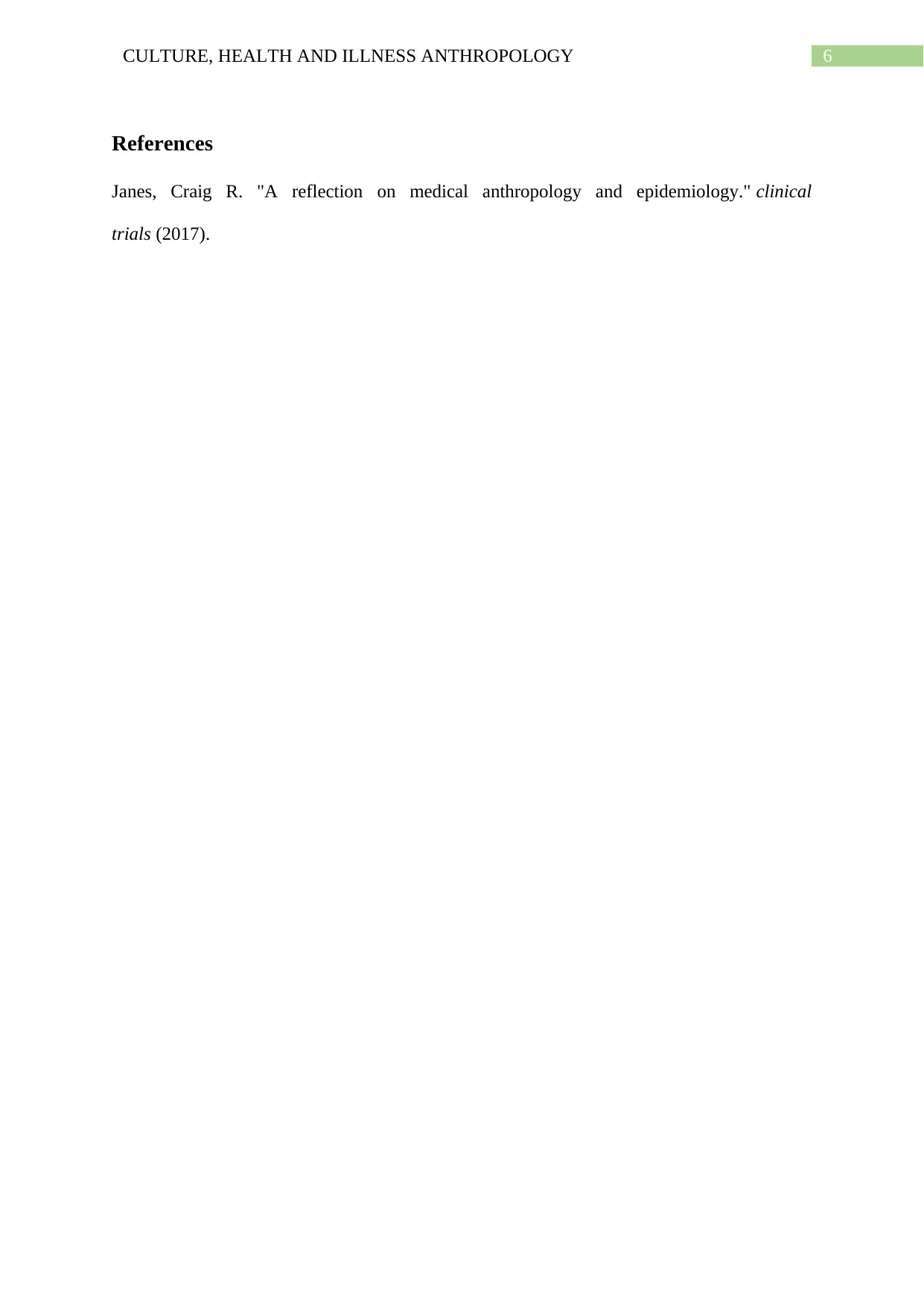
6CULTURE, HEALTH AND ILLNESS ANTHROPOLOGY
References
Janes, Craig R. "A reflection on medical anthropology and epidemiology." clinical
trials (2017).
References
Janes, Craig R. "A reflection on medical anthropology and epidemiology." clinical
trials (2017).
1 out of 7
Related Documents
Your All-in-One AI-Powered Toolkit for Academic Success.
+13062052269
info@desklib.com
Available 24*7 on WhatsApp / Email
![[object Object]](/_next/static/media/star-bottom.7253800d.svg)
Unlock your academic potential
Copyright © 2020–2026 A2Z Services. All Rights Reserved. Developed and managed by ZUCOL.





